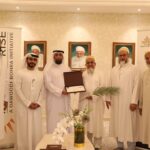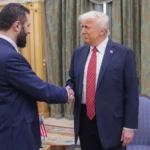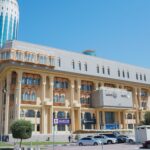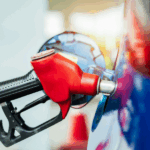The president of the United Arab Emirates, Sheikh Mohamed bin Zayed Al Nahyan, announced Thursday a sweeping plan to invest $1.4 trillion in the United States over the next decade, signaling deepening economic ties with Washington under President Donald Trump’s administration.
Speaking alongside Trump at the presidential palace in Abu Dhabi, Sheikh Mohamed described the initiative as a major vote of confidence in the bilateral relationship.
“The UAE’s plan to invest $1.4 trillion in the United States over the next 10 years is a testament to the strength of our strategic relationship,” the UAE president said.
The pledge comes during the final leg of President Trump’s four-day tour of the Gulf region, which has been marked by a series of major business, defense, and diplomatic announcements.
Major Defense and Infrastructure Deals
Earlier Thursday, Trump visited Al Udeid Air Base in Qatar, the largest U.S. military installation in the Middle East. Addressing American forces, the president confirmed Qatar would invest $10 billion to expand and modernize the facility in the coming years, according to Reuters.
In a parallel development, Qatar signed $42 billion in defense procurement deals on Wednesday. These announcements follow Saudi Arabia’s pledge earlier this week to invest $600 billion in the U.S. economy, including projects in energy and industrial infrastructure.
Qatar Airways also finalized a multibillion-dollar agreement to purchase up to 210 Boeing widebody aircraft, underscoring the commercial scope of the tour.
AI Ambitions and Technology Concerns
As part of its growing push to become a global hub for artificial intelligence, the UAE has reached a preliminary agreement with the United States to import 500,000 of Nvidia’s most advanced AI chips annually, starting this year, according to Reuters. The chips are expected to power large-scale data centers critical to the country’s AI roadmap.
While the deal supports the UAE’s long-term technological goals, it has reportedly sparked national security concerns in Washington, particularly over the risk of technology diversion. The agreement is still under review and may be subject to adjustments, U.S. officials said.
Diplomatic Signals
Trump’s Gulf trip has also included unexpected diplomatic overtures. On Tuesday, the U.S. president announced the lifting of longstanding sanctions on Syria and met with interim Syrian President Ahmed al-Sharaa. Trump publicly called on Sharaa to begin normalizing ties with Israel, in what observers view as an ambitious step toward regional realignment.
Final Meetings in Abu Dhabi
Trump is expected to conclude his Gulf visit following final high-level meetings with Sheikh Mohamed and senior Emirati officials in Abu Dhabi. Sources suggest that AI cooperation and technology partnerships will dominate the agenda, reflecting the UAE’s efforts to position itself at the forefront of the global digital economy.






